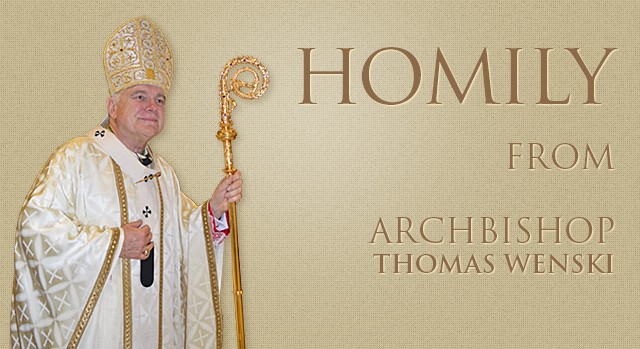By Archbishop Thomas Wenski - The Archdiocese of Miami
Archbishop Thomas Wenski preached this homily Aug. 20, 2018 at St. John Vianney College Seminary in Miami, during a retreat for professors and staff.
“Come, follow me...” Today’s Gospel of the rich young man is particularly appropriate for a Mass with this seminary’s faculty and staff. In one way or another, some more directly in spiritual formation and others as faculty advisors, but each of you accompanies the young men who come to St. John Vianney discerning a vocation to Holy Orders.
“What must I do to gain eternal life?” I remember one time a young seminarian told me that he wanted to be a priest “to save his soul.” I told him there were easier ways to go about saving your soul. To me, it is like a guy that is a bit “off” and so he goes into psychology to get his “stuff together.” It doesn’t work that way.
To save one’s soul: that’s a reason to become a Christian; but you become a priest to save other people’s souls.
Now, in no way, am I downplaying the necessity of holiness � and solid human formation � for a priest. Priests are not simply to be functionaries by any means. But it should go without saying that if you’re going to take care of other people’s souls, you got to take care of yours. The latest “explosion” about the misbehavior of priests carries a serious lesson for us all.
St. Paul worried that, after preaching to others, he could be lost. It’s like what they tell you on airplanes: if the cabin loses pressure, an oxygen mask will drop. Please put yours on first before attempting to help someone else.
I think the first question the young man asked Jesus requires some thought: “What must I do to gain eternal life.” The young man wants to do something � Pope Francis has talked about both a neo-Pelagianism as well as a neo-Gnosticism that infect our approach today to the spiritual life. And, I am sure, you can identify both of these trends in the men here. And introspection on our part might lead us to acknowledge their pull in our own spiritual lives. Jesus, however, rather than giving the rich young man something to do, he invites him to be someone, to be a disciple. I’ll leave it to the philosophers here to pontificate on the difference or the relationship between being and doing. Suffice it to say, that before one can be an effective apostle, one must be a committed disciple. We presume � and we demand � a level of commitment from these men. But this commitment � to be a Christian � needs to mature. And that happens from growing in intimacy with the Lord.
Of course, even though Jesus looked at the young man with love, the young man did not end up following Jesus. He went away sad, for he had many possessions. The possessions would not have necessarily prevented the young man from doing anything the Lord might have asked him to do, if he had so wished. They might have in fact helped him to do more. The possessions, however, were an impediment to his “being with the Lord.” That he went away “sad” indicates that his possessions in reality possessed him.
This invites a question: What do we really “possess,” what do we own? Everything the rich young man had, he had received from someone else. They came from his family, his community � and ultimately from God. All that any of us can claim as our own are our sins. Everything else is given to us in one way or another. And it is a sin to claim something as our own when it isn’t.
Therefore, Jesus’ invitation to “sell what he owned” was an invitation to a radical conversion of life.
Formation has to be about recognizing that, other than our sins, we own nothing � and what we are given we are given as stewards. To inspire the proper detachment from “possessions” among those entrusted to us, we have to grow in our own appreciation of our stewardship as members of this seminary community. None of us “owns” this seminary. It is not ours � for us to assume that we are free to shape it according to our needs, to force our own agendas into the formation process. We are the Church, but we do not “own” the Church. She belongs to Christ, the one Bridegroom.
In that sense, each one of us, can take a lesson from the airlines. If the oxygen mask falls down, before we can help anyone else, we have to put the mask first on ourselves. As we begin a new academic year, may we commit ourselves to that “change of heart” that frees us from sinful attachments to “having it our way” � for insisting on our way only puts us in the way of freely responding to the Lord’s invitation, “Come, follow me.”

